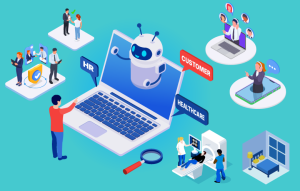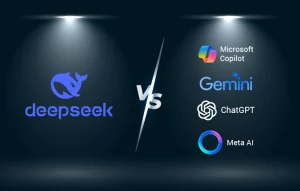The rapid rise of cognitive computing has created a big impact in the business world. It has become essential for enterprises to adopt cognitive computing applications to meet the changing dynamics of business. Businesses that fail to incorporate applications of cognitive computing integrated with artificial intelligence (AI), machine learning (ML) and data analysis capabilities might fail to stay ahead of the curve.
Cognitive AI solutions deliver transparent audit trails that explain the reason behind the provided recommendations and show all risk, evidence, uncertainty and confidence. Such cognitive-enabled AI solutions are designed for people to understand and for machines to interpret. These advanced applications are built to enhance operational efficiencies at scale, resulting in new revenue streams and increased ROI.
In today’s market, there are some cognitive computing apps with artificial intelligence integration that can seamlessly perform:
- Facial identification
- Text analysis
- Predictive analytics
- Behavioral pattern determination
- Handwriting recognition and more
In this blog, we will see how enterprises can leverage AI-powered apps integrated with cognitive technology.
“The cognitive services market is expected to reach USD 26.56 billion by 2026, at a CAGR of 36.45% over the forecast period 2021 – 2026.”
Mordor Intelligence
Here are the five major reasons for incorporating cognitive computing applications into your business processes:
1. To create engaging interactions
When an organization chooses to implement cognitive-enabled AI apps, they benefit at large as it brings empowerment to their business. The increased ability of cognitive-enabled AI apps to see, hear, speak, understand and interpret information sets allows businesses to create new and engaging experiences for their users.
Cognitive computing applications will change the way users interact with each other and the system as it will create an efficient, safe and sustainable environment. This AI solution will deliver more engaging and immersive experiences for your customers.
For instance, telecom service providers can improve the rising modern business challenges with the help of cognitive computing technologies related to speech and language. Thus, it can assist them in understanding natural language and translating text across mobile, desktop and web applications. Such a cognitive advantage has the power to transform the telecommunication industry.
2. To infuse intelligence in your applications
Cognitive technology is comprised of artificial intelligence, machine learning, data analysis and distributed algorithms. All of these add intelligence to drive user engagement and user experience automatically.
For instance, cognitive technology integrated into your existing applications will provide intelligence features in each app, across the components in your systems, such as:
- Emotion detection
- Facial recognition
- Speech and vision recognition
- Language understanding
- Video detection
- Translations and more

Discover what, why and how of Vision AI at the Edge
Webinar agenda
- What is Vision AI at the Edge
- Why vision AI at the edge is a game-changer
- Applications of Vision AI at the Edge
- Industrial use cases for accelerating AI at the Edge
- Q & A
These cognitive AI capabilities are beneficial to diverse industry verticals and are applied to support organizational communications. Artificial intelligence in apps has evolved through various forms, and this is one of them. The ability to infuse intelligence in your cognitive computing apps holds the potential to create new types of customer engagement by building smarter products, improving internal operations and making smarter decisions for all kinds of enterprises regardless of any industry.
3. To facilitate user engagement
Enterprises today are demanding enhanced user engagement. Hence, cognitive computing applications with ML and data analysis features can address this issue. Cognitive services help to elevate cross-channel experiences for your customers at every stage of their journey.
By leveraging a cognitive advantage, you are undoubtedly enhancing your customers’ experience. By learning more about their preferences, you will be able to provide experiences as per customer needs. This can help customers process and analyze their interactions in real-time. For instance, organizations can recommend the next best offer or next best action (NBA) to their customers based on their previous purchase history.
4. To give your applications a human touch
Computers, as we know, do not exercise human thinking. But with cognitive technology, you can give a human touch to your existing applications and bridge the empathy gap. Cognitive AI apps have overcome traditional tasks by introducing a human element (the ability to speak, hear, and talk like a human). You can develop cognitive-enabled AI apps to address day-to-day challenges just like humans do.
Cognitive computing technology enables natural and contextual interaction and helps in creating human-like conversations. For instance, with the use of search based on cognitive technology, banking personnel can make content-specific searches and gain access to the latest financial news and announcements for their work. This feature can bring a new shift in the banking industry.
5. To identify threats and fraudulent activities
Many organizations require monitoring of security measures to maintain safety and security standards, whether it is monitoring mobile phone calls, credit card activity, or identifying a person caught on the cameras. Facial recognition, video analytics, speech recognition text analysis and others are some of the cognitive computing capabilities that performs data analysis in real-time to detect fraudulent transactions or other anomalous activities.
A traditional data analytics system can take hours to analyze such activities, but cognitive computing applications with the power of ML and data analysis can be faster and more effective. Industries such as telecommunications, banking, or e-commerce can largely benefit using these features.
Insight
There is no doubt that cognitive computing applications will create numerous opportunities for enterprises, both in B2B and B2C segments. We can already see the rapid growth in cognitive technology with enterprise use cases. Many companies have already developed cognitive computing applications to experience modern-day cognitive technologies to improve critical business processes. If you wish to know how you can start reaping the benefits, get in touch with our experts and start with a consultation on the value of cognitive technology.









